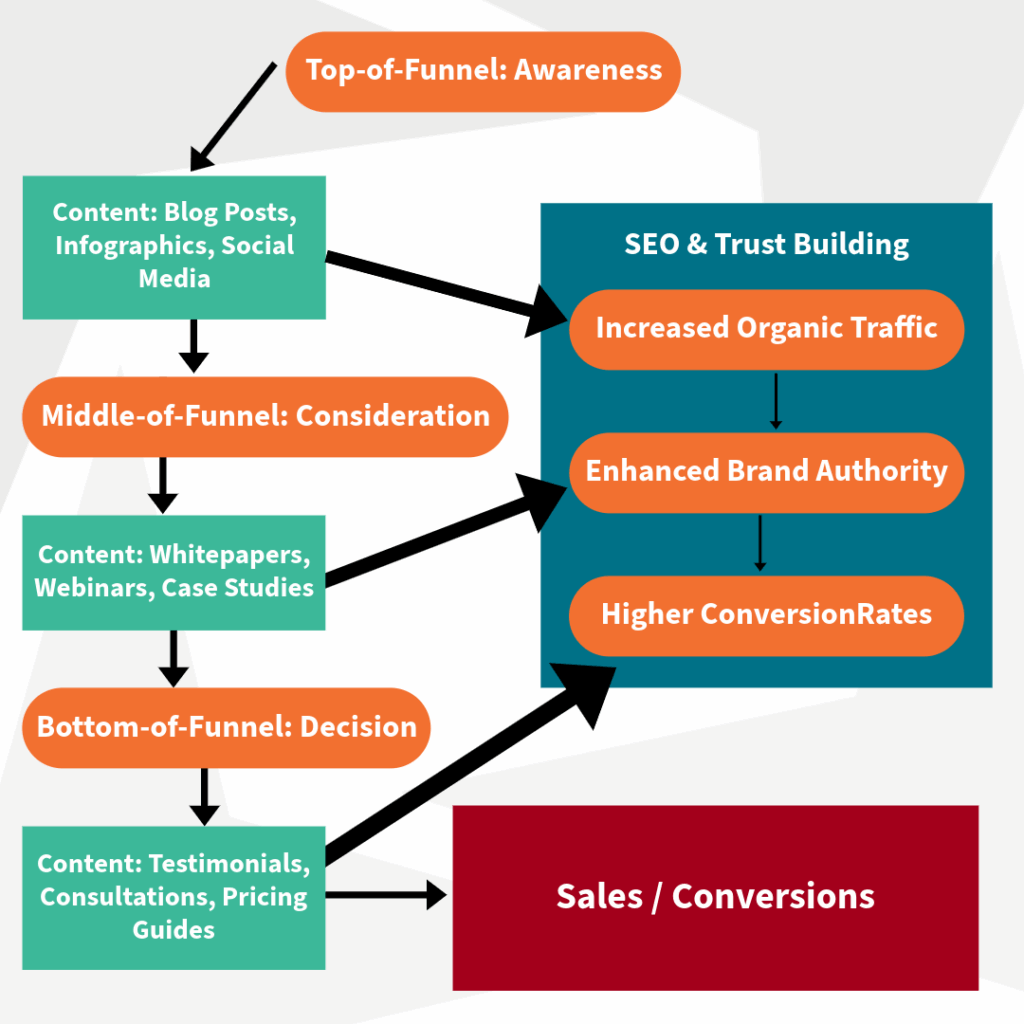The cybersecurity market is a **dense jungle** of intricate solutions, technical jargon, and countless players. As a provider of essential cybersecurity solutions, how do you navigate through this overwhelming landscape and connect with potential clients? The answer is becoming clearer: **strategic content marketing**. This isn’t merely about brochures or product specifications; it’s about **education, trust,** and showcasing your undeniable **expertise**. In this article, we’ll dive into why content marketing is not just a ‘nice-to-have’—it’s an **essential pillar** for successfully selling cybersecurity solutions in today’s digital arena.
1. Building Trust and Credibility: The Cornerstone of Cybersecurity Sales
Let’s be candid: when it comes to cybersecurity, **trust is paramount**. You’re not just selling software; you’re selling peace of mind. Businesses are entrusting you with their most sensitive data and operational continuity. And let’s face it, you can’t buy that comfort through flashy advertisements.
This is where content marketing truly excels. By consistently producing high-quality, informative, and insightful content, cybersecurity firms can position themselves as **trusted authorities** and thought leaders in the industry. Imagine this scenario: if you had a mysterious ailment, would you prefer to consult a doctor who only advertises heavily or one who publishes enlightening articles and speaks at conferences? The latter, right?
**Whitepapers, detailed blog posts, industry reports,** and webinars help demonstrate your team’s thorough understanding of current threats, emerging vulnerabilities, and the complexities of digital defense. It’s about educating your audience, not merely selling to them. In fact, research from Semrush shows that **84% of B2B marketers** reported their content marketing initiatives successfully built brand awareness in the past year, signifying the powerful reach of content.
As if that weren’t enough, consider that **B2B buyers now conduct an average of 12 online searches** before engaging with a vendor’s website. This underscores the necessity of having a rich and accessible content library to cater to their extensive self-education.
As we highlighted in our past article on cybersecurity marketing, “Buyers want proper insights before making a decision, and businesses providing quality information will stand out amidst the noise.” This approach transforms you from merely another vendor into a **trusted advisor**. Moreover, Google’s E-E-A-T (Experience, Expertise, Authoritativeness, Trustworthiness) guidelines significantly favor content from credible sources, further underlining the necessity for authentic expertise in your content.
For an international industry like cybersecurity, providing **multilingual or localized content** can significantly broaden your reach, deepening trust and ensuring your expertise resonates across diverse audiences worldwide.
Visual Aid 1: The Trust Funnel – How Content Builds Relationships
This flowchart illustrates how various types of content nurture prospects through the buyer’s journey, ultimately fostering trust and advocacy. At each stage, content builds relationships that lead to informed purchasing decisions.
2. Educating a Diverse Audience: Demystifying Complex Cybersecurity Topics
Cybersecurity can feel like a **technical labyrinth**. For many business leaders—especially those outside of IT departments—the terminology can be absolutely bewildering. Terms like **‘zero-day exploits,’ ‘phishing,’ ‘ransomware-as-a-service,’** and **‘DDoS attacks’** can sound like a different language. If your potential clients don’t fully grasp the **threat**, they’re unlikely to appreciate the **solution**.
Content marketing presents the perfect platform to **demystify** these complex topics. By using clear, concise, and accessible language, you can break down intricate threats and explain how your solutions provide tangible protection. It’s not about scaring people with fear-based messaging; it’s about **empowerment through understanding**. In fact, data from shows that **83% of B2B content** focuses on building brand awareness and interest, emphasizing the educational role of content.
A well-crafted content strategy also necessitates **identifying the varying levels of audience awareness** and technical understanding across diverse markets and buyer personas. Some audiences might require foundational explanations, while others may need comprehensive analyses of advanced persistent threats. This tailored educational content allows you to address varying needs—from **jargon-buster blog series** for beginners to in-depth whitepapers for advanced users—building confidence in their decision-making processes.
With a reported **88% of cybersecurity breaches** in 2024 caused by human error, educational content addressing these human factors becomes even more critical.
3. Boosting Organic Visibility and SEO: Being Found When It Matters Most
When a business discovers a potential cyber threat or realizes they have a security gap, what’s their first move? They **Google it**! If your content isn’t optimized to appear at the top of those search results, you risk becoming **invisible** when prospects need help the most.
Content marketing paired with a robust SEO strategy ensures your brand is prominently discoverable. Creating content that directly addresses your target audience’s pain points and common search terms can significantly boost your organic search visibility. This means more qualified leads coming to **you** instead of your competing for their attention. A report from CyberRisk Alliance emphasizes that “engaging content that resonates” and “real-world insights” are vital for connecting with decision-makers and enhancing visibility.
Consider the impact of authoritative content: Google’s E-E-A-T guidelines heavily favor content produced by **genuine experts**, which enhances your search rankings and signals to Google that your site is a **reliable source**. This, in turn, drives relevant traffic to your website.
Visual Aid 2: Content Marketing’s Impact on the Sales Funnel
This flowchart demonstrates how content marketing strategically supports each stage of the sales funnel, from initial awareness to final conversion, focusing on various content types that build trust and authority, thereby enhancing SEO and driving sales.
4. Nurturing Leads and Accelerating the Sales Cycle: From Prospect to Partner
The decision-making process for cybersecurity solutions is rarely impulsive. It’s a long, considered journey involving multiple stakeholders and significant investment. This is where content marketing proves invaluable in nurturing leads through the sales cycle, providing **valuable information** at each stage.
During the **awareness stage**, your blog posts and social media content might highlight the realities of general cyber threats. As prospects shift to the **consideration stage**, they may download whitepapers on GDPR compliance, view webcasts on cloud security, or explore **case studies** showcasing successful implementations for companies similar to theirs. Such real-world examples act as proof points, demonstrating how your solutions effectively mitigate risks.
As prospects enter the **decision stage**, the focus turns to direct actions. Here, your content should facilitate the next step, including clear **Calls-to-Action (CTAs)** like “Get a Quote,” “Plan Your Implementation,” or “Sign Up for a Free Trial.” This isn’t merely about informing—it’s about providing the right info at the right time to guide them closer to a purchase. Personalized email nurturing campaigns driven by content can keep your brand top-of-mind, addressing specific concerns and nurturing a relationship that transcends mere transactions. Leveraging AI-driven personalization—an emerging trend for 2025—can refine content delivery to tailor messaging based on user behavior and preferences, boosting engagement and shortening sales cycles.
5. Demonstrating ROI with Case Studies and Success Stories: Real-World Validation
In the cybersecurity sector, **proof matters**. Businesses need tangible results that illustrate how a solution has successfully mitigated risks. This is where case studies, testimonials, and success stories come into play—powerful forms of content marketing that provide concrete evidence of your solutions’ effectiveness.
A well-crafted case study outlines a client’s initial challenge, the solution you provided, and the measurable outcomes achieved (such as “reduced security incidents by 40%” or “achieved 99.9% uptime”). This type of **social proof** is impactful. Research by TechnologyAdvice indicates that **63% of B2B tech buyers** prioritize customer case studies during their decision-making process.
Incorporating these real-world examples into your content strategy—be it through a dedicated ‘Success Stories’ section on your website, downloadable PDFs, or snippets within webinars—provides the validation potential clients require to feel confident in their investment. It demonstrates that your expertise delivers measurable results. For instance, companies utilizing **AI** and automation tools in security witnessed a **2.2% reduction in breach costs** in 2024—an insightful statistic that could be leveraged in your case studies.
Conclusion: Content as Your Cybersecurity Foundation
In an environment where the stakes are high and the landscape constantly evolving, content marketing is more than just a promotional tool for selling cybersecurity solutions; it’s the **foundation** of a successful cybersecurity business. It’s about building trust in a field where trust is absolutely non-negotiable. It’s about educating decision-makers—many of whom may not be technical experts—on complex threats and the critical protection your solutions offer.
With cyber threats continually escalating—the average number of cyberattacks per organization per week increased by **75% YOY in Q4 2024**—the demand for clear, credible information will only intensify. By investing in a comprehensive content marketing strategy, one that prioritizes education, thought leadership, SEO, and demonstrable successes, cybersecurity firms can cut through the noise, establish genuine authority, and protect more businesses against the relentless tide of cyber threats.
So, if you’re engaged in digital defense, it’s crystal clear: your content is a **vital asset** for fostering trust and driving growth across all your target markets.
Ready to bolster your cybersecurity sales strategy with compelling content, including cutting-edge GEO (Generative Engine Optimization) techniques to enhance visibility in AI-powered search environments? Contact us today for expert insights and a tailored content marketing plan that safeguards and elevates your business globally.
Speak to Cybersecurity Marketing Experts






